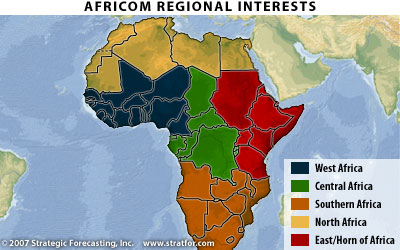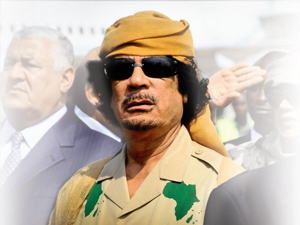U.S. Gov't Destabilizing Africa through AFRICOM
By Jehron Muhammad | Last updated: Oct 11, 2013 - 12:10:54 PMWhat's your opinion on this article?

|
Violence, including the longstanding conflict (you might remember “Black Hawk Down”) in Somalia has spread to include Ethiopia, Uganda and most recent victim Kenya.
While global concern focuses on poison gas attacks in Syria, Iran’s alleged creation of nuclear weapons, and the coup of the first democratically- elected Egyptian president, “Libya has plunged unnoticed into its worst political and economic crisis since the defeat of Gadhafi two years ago,” according to The Independent, a UK based newspaper.
Not only have militias taken over the Libyan countryside and Libyan crude output gone down to a trickle, The Independent reported, “government authority is disintegrating in all parts of the country putting in doubt claims by American, British and French politicians that NATO’s military action in Libya in 2011 was an outstanding example of a successful foreign military intervention, which should be repeated in Syria.”
Caught off guard by America’s regime change initiative in Libya and instability it caused in places like Mali, the continent-wide African Union has yet to confront the growing footprint of AFRICOM, the U.S. Africa Command.
Why? It may have to do with AFRICOM’s ability to hide the real purpose of its presence in Africa.

|
It could also be that the AU voice is muzzled since external donors (U.S. and European) funded African Union program costs in 2013 to the tune of $155.3 million or 56 percent of the total AU budget. The AU member states, according to Pambazuka.org, fund mostly operational costs, $122.8 million or 44 percent of the budget. Of this only $5.3 million “goes toward programs of the AU while 96 percent goes to operational costs,” said authors Janah Ncube and Achieng Maureen Akena.
Outgoing AU chairman Dr. Ping, during his last address to the executive council in 2012, said the AU has “little legitimacy in claiming marginalization in global politics when it is unable to be self-sustaining and depends on donors to support its programs,” reported Pambazuka.

Col. Muamar Gadhafi
‘The late President Gadhafi utilized Libya’s oil wealth to block the spread of AFRICOM. With no deterrent equal to Gadhafi , the increased instability on the continent will continue.’ |
The increasing instability that is in the Middle East and North Africa is destined to plague the continent. The African Union, this author feels, should raise its voice wherever U.S. and European forces or proxies have intervened militarily. The interventions are deepening problems in nations and regions, creating refugees, increasing militia groups and creating more areas awash in weapons.
In the post 9/11 era and in the wake of U.S. “stability” operations in Africa which only accelerated during the Obama years, “militancy has spread, insurgent groups have proliferated, allies have faltered or committed abuses, terrorism has increased, the number of failed states has risen, and the continent has become more unsettled,” wrote Turse.
The recent massacre in a Kenyan suburb, inside an upscale shopping mall in Nairobi’s affluent Westlands area, is a case in point. Hooded gunmen claiming to be members of Al-Shaabab took responsibility for the attack in retaliation for Kenya’s role in the war against militants in Somalia. At least 72 people were killed.
The Somali group Al-Shaabab, according to news reports, “vowed in late 2011 to carry out a large-scale attack in Nairobi in retaliation for Kenya’s sending of troops into Somalia to fight” Islamic insurgents. AMISOM, the U.S. and European funded African Union Mission in Somalia, is to a large extent responsible for Kenya’s search and destroy incursions inside Somalia.
AMISOM has also used Ugandan troops. In 2010 over 60 persons, in three different suicide bomb attacks, were killed while watching the World Cup in Uganda. Al-Shabaab claimed responsibility. Yusef Sheikh Issa, an Al Shabaab commander in Somalia told the Associated Press, “Uganda is one of our enemies. Whatever makes them cry, makes us happy.”
If one looks deeply into what brought about the rise of Al-Shabaab you discover a U.S.-supported invasion by Ethiopia.
Ethiopia—following in the footsteps of the U.S.-sponsored Joint Operations Command that included the CIA—invaded Somalia under the cover of hunting for persons responsible for the bombings of U.S. embassies in Kenya and Tanzania. This invasion was the final nail in the coffin of the Islamic Courts Union, which was responsible for the closest Somalia has come to a stable government in recent history.
If a picture is worth a thousand words, what’s a map worth? Take the one created by TomDispatch that documents U.S. military outposts, construction, security cooperation, and deployments in Africa. “It looks,” according to Turse, “like a field of mushrooms after a monsoon.” U.S. current military involvement is found in “no fewer than 49 African nations,” he said.
President George W. Bush announced in 2007, the establishment of AFRICOM, a unified command for U.S. military forces in Africa. He said AFRICOM was being launched for purely peaceful reasons.
“Military aid and questionable trade” have always been the “the twin pillars” of America’s involvement in Africa.
“Imperial acquisition (or the acquisition of natural resources),” according to Crossedcrocodiles.com, “masquerades as humanitarian aid and manifests as the militarization of the continent through the U.S. Africa Command, AFRICOM.”
The late President Gadhafi utilized Libya’s oil wealth to block the spread of AFRICOM. With no deterrent equal to Gadhafi , the increased instability on the continent will continue.
(Jehron Muhammad, who writes from Philadelphia, can be reached at Jehronn@ msn.com.)
Related news:
Amercia's Shadow wars in Africa (USinAfrica.com)
Zimbabwe’s president: West seeks to plunder Africa (FCN, 05-17-2013)
'Well-behaved' African leaders rewarded by President Obama (FCN, 05-10-2013)
Wikileaks reveals unflattering U.S. view of African 'client states,' leaders (FCN, 12-09-2010)
Obama then Hillary: U.S. scrambles for Africa (FCN, 08-31-2009)
Re-packaged AFRICOM still not good for Motherland (FCN, 07-01-2009)
Is Africom a U.S. military maneuver or real help? (FCN, 02-05-2009)
Africa continues to reject US military command (FCN, 01-14-2008)
Africom: Wrong for Liberia, Disastrous for Africa (The Perspective, 09-18-2007)
Africa rebukes Bush on African Command (FCN, 07-11-2007)
How the U.S. Government destabilized foreign governments (FCN, 07-22-1985)
INSIDE STORIES AND REVIEWS
-
-
About Harriett ... and the Negro Hollywood Road Show
By Rabiah Muhammad, Guest Columnist » Full Story -
Skepticism greets Jay-Z, NFL talk of inspiring change
By Bryan 18X Crawford and Richard B. Muhammad The Final Call Newspaper @TheFinalCall » Full Story -
The painful problem of Black girls and suicide
By Charlene Muhammad -National Correspondent- » Full Story -
Exploitation of Innocence - Report: Perceptions, policies hurting Black girls
By Charlene Muhammad -National Correspondent- » Full Story -
Big Ballin: Big ideas fuel a father’s Big Baller Brand and brash business sense
By Bryan Crawford -Contributing Writer- » Full Story






 Click Here Stay Connected!
Click Here Stay Connected!








